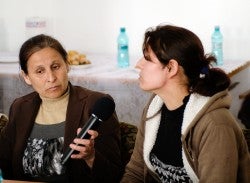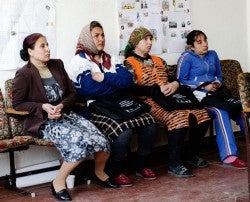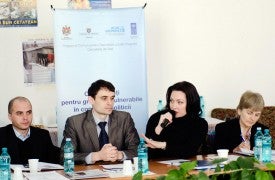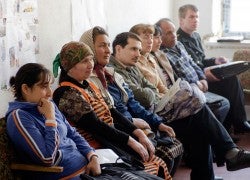Romani women discuss the decentralization reform and the opportunities it opens for them in Moldova
Date:
Today Romani women from three districts of Moldova took part in the public debates “Opportunities for vulnerable groups in the context of decentralization reform: Roma” that took place in Tibirica commune. The debate was organized at the threshold of the International Roma Day by the State Chancellery of the Republic of Moldova with a support of the Joint Integrated Local Development Programme (JILDP) implemented by UNDP and UN Women, funded by the government of Sweden.
The challenges faced by Romani women in access to local services in the areas of health, education, as well as employment and social protection were discussed with the representatives of central government and local public authorities. Together they looked at possible solutions and opportunities, which the decentralization reform is offering for this vulnerable group.
The decentralization reform in Moldova aims at building autonomous and democratic local governments, which provide quality local services equitably taking into account the rights of women and men from vulnerable groups, such as Roma and other ethnic minorities, persons with disabilities, older persons etc. The needs and status of the women and girls representing these groups are accorded low priority in local development agendas and little action is taken to address their needs and increase access to local services and resources. Since as a result of the reform the government will be nearer to them, women take a closer interest in local development planning and budgeting holding them accountable to local needs. This part of the reform agenda is more open than others to the active participation of Romani women as the clients of local government services.
Through JILDP UN Women works to address deficits in power and voice of Romani women empowering them, increasing their capacities to voice their needs, to advocate for their rights and to make local development inclusive and responsive to a full range of their rights concerns.
Thus, during the public debate Romani women from the programme pilot communities - Schinoasa, Vulcanesti, Ursari – shared their successful experiences in identification of the community development needs and priorities, which they had done jointly with the local public authorities, their participation in the local development planning and successful advocacy for taking their needs into account.
“There are more than 300 people living in Schinoasa village. The majority are women and children, our men are working outside the village. We face a lot of problems, but the key of them is the lack of drinking water. For many hours during the day we carry buckets full of water up the hill to our houses. We rose the issue with the local authorities, made them recognize it as a priority for us, developed a project and soon we will have a water supply system in our village!” – said Ala Popkov, UN Women community mobilizer.
The community mobilization for empowerment approach applied by the programme brings its first results, as the marginalized Romani women from the most poor and vulnerable communities of Moldova increasingly raise their voice claiming for their rights and increased attention to their needs.



